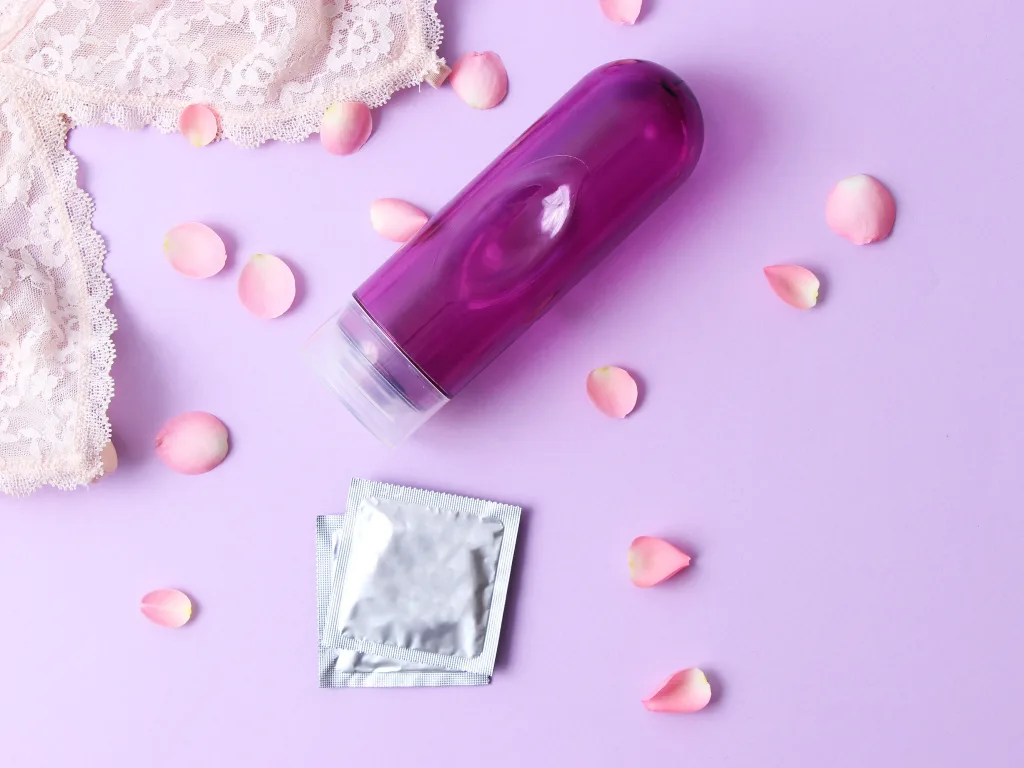You’ve probably heard that lubricants can help make sex more enjoyable, but did you know they can also increase your risk of a urinary tract infection (UTI)? While lube can certaily be beneficial in many ways, it’s important to understand the potential risks associated with using one.
Generally speaking, lubricants are safe and effective when used correctly. However, some types of lubes can increase your chances of getting a UTI by introducing bacteria into the urethra during intercourse. This is especially true for lubricants that contain spermicide or glycerin, as well as those made with sugar or sweeteners like xylitol. Additionally, flavored lubes should be avoided during vaginal intercourse since they contain glucose which can cause yeast infections.
If you’re concerned about developing a UTI due to lube use, here are some tips for reducing your risk:
– Use a personal water-based lubricant to reduce friction during intercourse and lower the chance of introducing bacteria into the urethra.
– Avoid lubricants containing glycerin or spermicide which can irritate the urethra and increase your risk of infection.
– Steer clear of condoms with scents, colors, or flavors as these may also lead to irritation and infection.
– Never use flavored lubes for vaginal intercourse—they contain sugars which can cause yeast infections.
Overall, using lube is generally safe when done correctly and helps make sex more comfortable and enjoyable for both partners. But it’s important to understand the potential risks associated with using certain types of lubricants so that you can take steps to protect yourself from developing a UTI.
The Risk of UTI Due to Lube Ingredients
Certain ingredients in lubricants can cause urinary tract infections (UTIs). These include lubricants with a spermicide, lubricants made with glycerin or sugar, xylitol, or any sweetener that can become food for bacteria. It’s also important to check the pH level of your lubricant, as a pH that is too acidic can cause an imbalance in the bacteria in your body and result in a UTI. Finally, certain preservatives used in lubricants may also increase your risk of getting a UTI. If you’re concerned abut getting a UTI from using lubricant, it’s best to find one that is free of spermicides and other potentially harmful ingredients.

Can Lubricant Lead to Infection?
Yes, lubricant can cause infection if it contains certain ingredients. In particular, lubricants with sugar (glucose) or glycerine can increase the risk of yeast infections in women. For this reason, it is important to avoid using flavored lubes for vaginal intercourse, as they typically contain sugar. Additionally, many water-based lubes contain glycerine which can also trigger yeast infections. If you are concerned about potential irritation or infection, it is best to use a lubricant specifically designed for vaginal use that does not contain these ingredients.
Can Lubricant Cause Urethral Irritation?
Yes, lubricants can irritate the urethra and cause discomfort or burning. This is especially true for flavored, colored, or scented lubricants, as they contain more chemicals that can be irritating. It is important to read the label of any lubricant you are using to make sure it does not contain any added fragrances or flavors, and if you experience any burning or discomfort upon application it is best to discontinue use and try a different product.
The Effectiveness of Lubricants in Treating Urinary Tract Infections
Yes, using a personal lubricant during intercourse can help reduce friction and the risk of urinary tract infections. Friction during intercourse can sometimes irritate the urethra and introduce bacteria that cause UTIs, so using a small amount of water-based lubrication may help reduce this risk. It’s important to note that lubricants containing glycerin or other ingredients may increase the risk of infection, so it’s best to use a water-based lube that is free of these ingredients.
The Risk of Bacterial Infection from Lubricant Use
Yes, lubricants can cause bacterial infections. This is because lubricants often contain antimicrobial preservatives wich can alter the composition of the cervicovaginal microenvironment and lead to vaginal dysbiosis or Bacterial Vaginosis (BV). Studies have found that the use of lubricants is associated with an increased risk of developing BV. This risk is especially high for people who use oil-based lubricants and those who douche frequently. Additionally, lubricants may create an environment that is conducive to other microbial infections, such as yeast infections and urinary tract infections (UTIs). If you experience any symptoms of a bacterial infection after using a lubricant, it is important to contact your healthcare provider to receive treatment.

The Impact of Lubricants on pH Balance
Yes, lube can affect your pH balance. The vagina is naturally acidic with a pH of 3.5 to 4.5, which helps keep it healthy and free of bacteria and other infections. However, some lubes contain ingredients that can alter the natural pH balance of the vagina, making it either more alkaline or more acidic. This can cause irritation and other issues such as bacterial vaginosis or yeast infections. It’s important to choose a lubricant that is pH balanced and hypoallergenic to ensure it won’t interfere with your vaginal health.
Potential Side Effects of Using Lube
The most common side effects of lube include allergic reactions, skin irritation, and yeast infections. Allergic reactions may present as rashes, itching or swelling. Skin irritation may include redness, burning or stinging sensations. Yeast infections can cause itchiness, redness and a thick white discharge.
In rare cases, lube can interfere with fertility and could dry up quickly, requiring frequent reapplication. If these symptoms occur or if any other unusual changes to your body are experienced after using lube, it is best to speak to a doctor about the potential side effects.
Consequences of Using Too Much Lubricant
Using too much lubricant can negatively impact the state of the joints. It can cause an increase in pressure within the seals, resulting in their deterioration and eventual breakage. This affects the mechanical system by allowing water and dirt to enter and potentially damage it. Excessive lubrication also reduces friction, which reduces the efficiency of the mechanical system and increases wear on components. Furthermore, it may lead to oil starvation which can cause increased heat generation and eventual breakdown of components.
The Risk of Infection from Using Water-Based Lubricants
Yes, water-based lubricants can cause infections. Some water-based lubricants contain high levels of sugar which encourages the growth of yeast, a type of fungus. Additionally, lubricants containing glycerin have been linked to an increased risk of developing a yeast infection. To reduce the risk of infection, it is important to choose a water-based lubricant without high levels of sugar or glycerin. It is also important to practice safe sex and use condoms to reduce your risk of contracting a sexually transmitted infection.

The Potential Link Between Low Lubrication and Urinary Tract Infections
Yes, using a low amount of lubricant during sex can cause a urinary tract infection (UTI). The friction caused by insufficient lubrication can cause irritation to the delicate tissue of the urethra and vagina, making it easier for bacteria to enter the body and cause an infection. To reduce your risk of developing a UTI, use plenty of lubrication during sex to minimize friction.
Can Silicone Lube Increase the Risk of Urinary Tract Infections?
Yes, silicone-based lube can cause UTIs. This is because the silicone in the lubricant can act as a barrier, trapping bacteria in the vagina or urethra and preventing the body from naturally flushing out bacteria. This can lead to an environment where bacteria can multiply and cause a urinary tract infection. Additionally, some lubricants can contain chemicals or dyes that may irritate the sensitive skin of the vagina or urethra and increase your risk of getting a UTI. It’s best to avoid using silicone lube if you are prone to developing UTIs or have had one in the past.
Understanding the Causes of Recurring Urinary Tract Infections
Recurring urinary tract infections (UTIs) can be caused by a variety of factors. These include having an underlying medical condition, such as diabetes or an autoimmune disorder; having a suppressed immune system; or having certain neurological diseases or kidney and bladder stones. Poor hygiene and sexual activity are also risk factors for developing UTIs. Additionally, some medications, such as antibiotics, may contribute to recurrent UTIs. If you think you may be prone to UTIs, it’s important to talk to your doctor about possible treatments and prevention strategies.
How to Cure a UTI Quickly
A urinary tract infection (UTI) can usually be cured quickly and effectively with the right treatment. The most commonly prescribed medications for UTIs are sulfamethoxazole/trimethoprim and nitrofurantoin. Sulfamethoxazole/trimethoprim is a first-choice medication and can treat a UTI in as little as 3 days. Alternatively, nitrofurantoin is aother first-choice option for UTIs, but you typically have to take it for at least a week to be sure that the infection has been fully cleared. If your symptoms do not improve after using these medications, or if you experience any side effects, contact your doctor immediately. Additionally, drinking plenty of fluids may help flush out the bacteria that cause UTIs, while avoiding caffeine and alcohol can also reduce your risk of getting a UTI.

How to Quickly Treat a Urinary Tract Infection
There are several steps you can take to help relieve the discomfort of a urinary tract infection (UTI) and potentially speed up its healing. First, it is important to drink plenty of fluids, including water, cranberry juice, and unsweetened tea, to help flush out the bacteria causing your UTI. You should also try to avoid bladder irritants such as caffeine, alcohol, and spicy foods. Additionally, you may want to increase your intake of probiotics as they can help restore the balance of healthy bacteria in your system. Lastly, taking an over-the-counter pain reliever like ibuprofen can help reduce pain and swelling associated with your UTI. If you are still experiencing symptoms after a few days of home remedies, you should consder visiting your doctor for further treatment.
Conclusion
In conclusion, using certain lubricants or lubricants with spermicide can increase the risk of developing a urinary tract infection. Lubes made with glycerin, sugar, xylitol or other sweeteners can caue yeast infections and irritation of the urethra. It’s important to check the PH of your lubricant and avoid flavored lubes for vaginal intercourse, as they contain sugar and can cause yeast infections. Using a small amount of water-based lubrication during intercourse can help reduce friction and the risk of infection. Ultimately, it is important to be aware of the potential risks associated with using certain lubricants in order to prevent UTIs and other complications.
